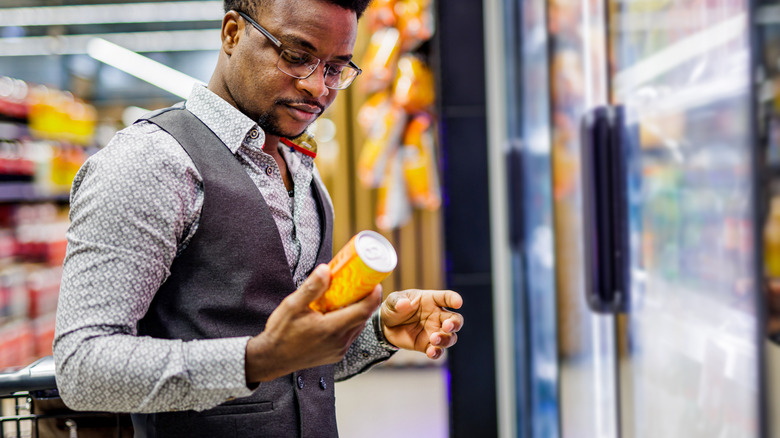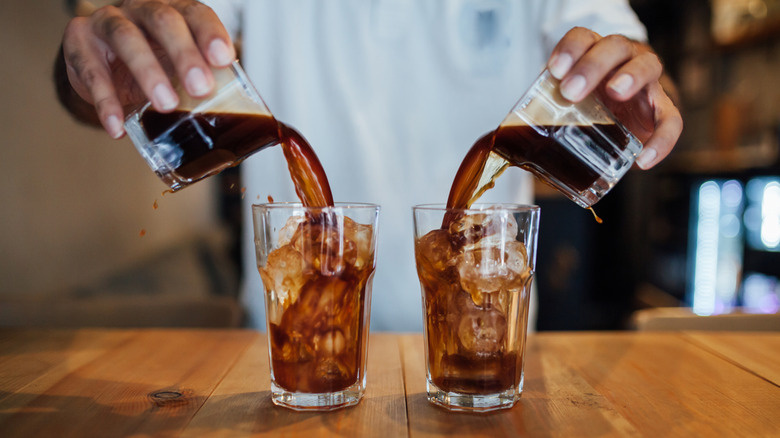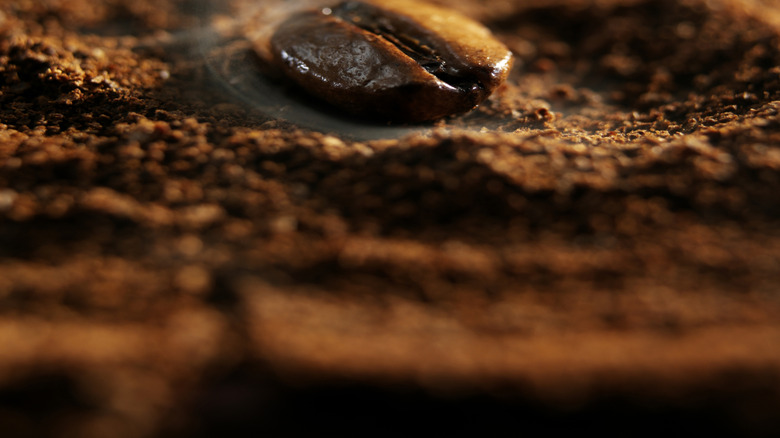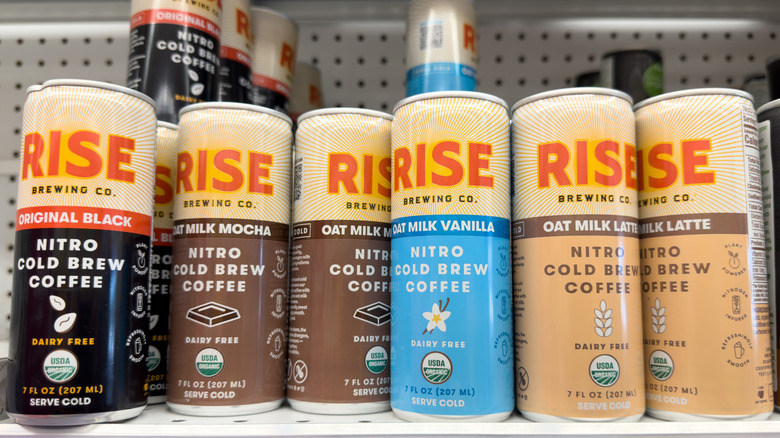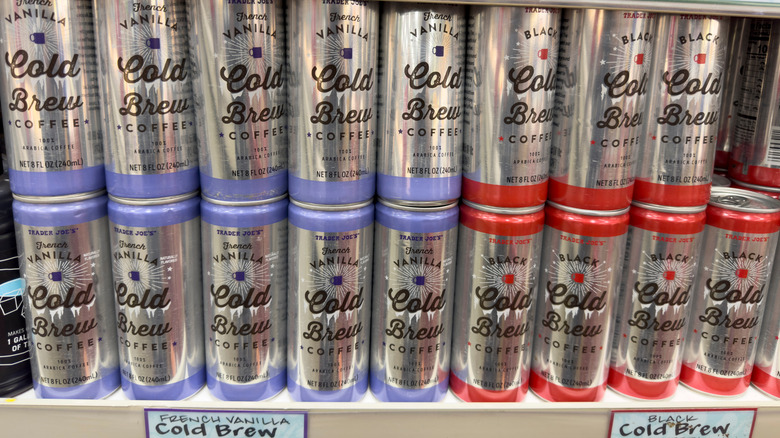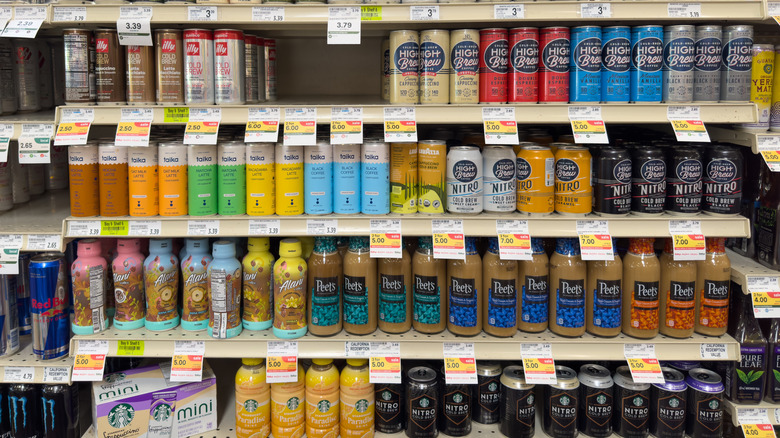5 Expert Tips For Buying Better Canned Cold Brew
On those days when two cups of coffee don't seem like enough, it might be time to pick up a cold brew instead. These strong drinks contain more caffeine than iced coffee thanks to their intensive brewing process, so one can keep you super-caffeinated and awake. Energy benefits aside, cold brews also generally taste silky and luxurious and boast lower acidity levels than flash brews. In short, these drinks have more benefits than one.
If you're not going to a cafe for a cold brew, or making one yourself at home, grabbing a canned one off the shelf is the next best thing. Still, with all the options available on grocery store shelves, how can you confidently decide which cans to add to your cart? To find out, Chowhound got exclusive intel from Taylor Young, an ACS-certified chemist and the Quality Director at Copper Moon Coffee, on what to look for in canned coffee. His handful of tips should help you in your quest for better canned cold brew.
Say yes to brands with minimal ingredients
As with a lot of products, Taylor Young says that going for a cold brew with a minimal ingredient list is best. "Avoid products with added preservatives, artificial sweeteners, or vague ingredient labeling," he said. You only really need ground coffee and water to make cold brew, and too many other additions are just overkill.
Cold brew is often made in small batches and lends a great natural flavor, so too many other ingredients will alter the natural flavor of the drink. In short, it's a big red flag. Cold brew should be strong and wholesome enough to stand on its own, so if you see any impossible-to-pronounce terms on a can's ingredient list, it's best to steer clear.
Make sure you know where the beans came from
Too many ingredients in a canned coffee is a red flag, but so is too little information. After all, it takes a lot of ground coffee to craft a good cup of cold brew, so you should want the main ingredient in the drink to be of the highest quality. "Clear sourcing of the coffee beans" is important, says Taylor Young.
You can't know for sure whether the beans are good unless you know where they come from, so check whether that information is listed on the can. (Or, at the very least, the brand's website.) Generally speaking, going for a cold brew made from single-origin beans or that comes from a local roaster is best to ensure optimal quality.
Say no to added flavors or sweeteners
While indulging in a sweet vanilla drink in the morning may be a fun way to start the day, flavored canned drinks aren't always as innocent as they seem. "Be cautious of excessively sweetened options, as they may mask inferior coffee quality," Taylor Young warns. This doesn't mean you should steer clear of flavorings entirely, it just means you should approach flavored drinks with a cautious eye. "Even flavors that are labeled as "Natural" or "Natural and Artificial" are highly processed and not at all what a typical consumer would consider to be "natural", he says.
It pays to do your research to make sure the brand you're buying is using real, quality flavorings. (And if not, try purchasing plain cold brew and making your own simple syrup at home.)
Keep it 100% real cold brew
Specifics are always good. For cold brew, you need to make sure you're buying pure cold brew, as this is the real stuff. "Ensure it's 100% real cold brew coffee (not concentrate or coffee-flavored drink or containing coffee extracts or coffee flavoring)," Taylor Young says. If you opt for cold brew concentrate instead, you can't consume it straight out of the bottle as it will be too strong.
You need to dilute the concentrate with water or milk, and if you don't follow the directions exactly, you might mess up the flavor. With 100% cold brew, you can consume it straight out of the can, making it a more convenient and reliable choice.
Make sure it's a roast profile you like
Whether you prefer a blonde roast brew or a dark, that choice is always up to you. "Verify the roast profile aligns with your preferences," Taylor Young advises. Blonde coffees tend to taste lighter and more complex, while darker roasts tend to be heartier and more simplistic in flavor. (And if you're wondering, a coffee's roast profile does not indicate anything about the caffeine levels of the drink, only the flavor.)
If you're still at a loss with all these tips in mind, check out our ranking of popular store-bought iced coffees, listed worst to first. Otherwise, happy hunting!
